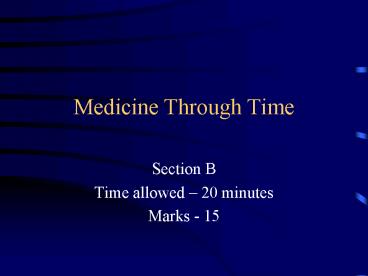Medicine Through Time - PowerPoint PPT Presentation
1 / 10
Title:
Medicine Through Time
Description:
A simple question relating to the source(3 marks), plus. A general question, ... you could explain how Florence Nightingale helped to break down prejudice ... – PowerPoint PPT presentation
Number of Views:54
Avg rating:3.0/5.0
Title: Medicine Through Time
1
Medicine Through Time
- Section B
- Time allowed 20 minutes
- Marks - 15
2
Type of questions
- A simple question relating to the source(3
marks), plus - A general question, either about
- Factors affecting the development of medicine.
- Significant events in the development of medicine
(turning points) (12 marks)
3
How to answer the first part of the question
- You should aim to explain briefly what the source
shows/implies about the event/factor highlighted
in the question. - In the mark scheme you are rewarded for accurate
details, but automatically gain higher marks for
explaining the inference of the source. - Your answer should be a very short paragraph.
4
How to answer the second part of the question
successfully
- You need a good structure to your answer.
- You need to include detailed and accurate
examples in your answer. - Your examples should usually be taken from a
range of periods studied (remember the topic is
Medicine Through Time.)
5
Factors affecting the development of medicine
include
religion
war
individuals
governments
science
chance
technology
wealth
communication
6
Revising a factor
- Examples of ways in which the factor has helped
the development of medicine.
- Any examples of ways in which the factor has
hindered the development of medicine.
Then make links with other factors .
7
How important has science been in explaining the
cause cure of disease since the 17th Century?
- Science has been very important because
- Louis Pasteur chemist experiments germ
theory - Robert Koch identification of bacteria
- Vaccination
- Penicillin work of Florey Chain
- However it was not science alone which helped
with these developments, e.g. - Technology was needed, such as better microscopes
for Pasteur Koch ( other e.g.s) - War contributed to rivalry between PK which
encouraged their research - War also helped to accelerate the development of
penicillin
Overall, I think that science has been
8
Why was the nineteenth century a period when the
part played by women in medicine changed so much?
- Role of individuals in changing attitudes towards
women in medicine. - Improved opportunities for education and
training. - Legislation role of central government.
- For individuals, you could explain how Florence
Nightingale helped to break down prejudice
against women, and link to education training
of nurses. - Also look at early women doctors, and how they
fought for the right to train, and the ways laws
changed.
Add a conclusion to say which factor you think
was the most important, and why.
9
How to answer questions about turning points
successfully.
- You must explain what the situation was like
before the turning point. - You must then identify briefly what the turning
point involved.
- You then need to explain what the situation was
like after the turning point what were the
consequences, both in the short and long term.
You should add a conclusion to say how far the
event can be considered a turning point.
10
Why was Pasteurs work on the germ theory a
turning point in the history of medicine?
- Explain the situation before-
- Belief in spontaneous generation
- Ignorance about true cause of decay/disease
- Impossible to develop scientific treatments
without this knowledge. - Ignorance led to unhygienic conditions for
surgery childbirth. - Explain briefly what Pasteur discovered, then. .
.
- Explain the consequences
- Pasteurs work led to an accurate and scientific
understanding that germs cause disease. - His work could be developed by other
doctors/scientists such as Koch - Vaccinations could be developed, especially as
specific germs were identified. - The need for hygienic conditions in surgery was
now demonstrated, leading to antiseptic and
aseptic surgery.
Conclude with your opinion e.g. his work
finally uncovered the true cause of disease,
which had been debated for hundreds of years. It
opened a totally new phase of medicine.































